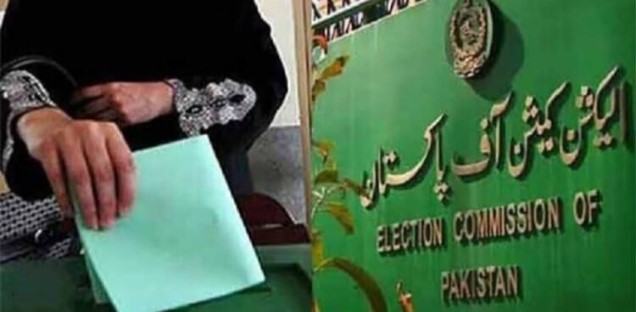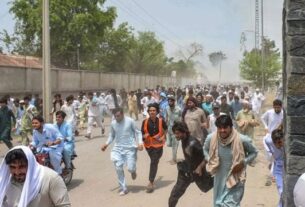1. Polling station
In preparations of the forthcoming general elections, the Hyderabad polling station count has been deemed “highly sensitive” by the Election Commission of Pakistan (ECP). This designation is a part of a larger initiative to maintain peace and security amid one of the nation’s most highly tense times. Given Hyderabad’s history of political unrest and electoral violence, it is critical to comprehend the significance of this action and how it affects the entire electoral process. More than 181 Hyderabad polling places have been identified as risky.
the effect on candidates and voters as well as the wider ramifications for Pakistan’s democratic process. We will also examine how this action fits into the larger global picture of election security as well as the function of technology and the media in promoting openness.
2. Higly Sensitive ?
In Pakistan, designating polling places as “highly sensitive” is a customary practice for elections, particularly in regions where political unrest and electoral fraud are common. “Highly sensitive” describes the possibility of events like these:
Political competition has long existed in Hyderabad, and during election seasons, hostilities tend to increase. There is a higher chance of conflicts between party supporters because these stations are usually found in areas with significant political groupings.
Voter intimidation:
In certain regions, influential political individuals or organizations may make an effort to sway the results by intimidating voters. This could involve using violence, coercion, or threats to prevent someone from exercising their right to vote freely.
Possibility of Electoral Fraud:
Attempts at ballot stuffing, vote tampering, or result manipulation are more likely to occur in highly sensitive stations.
Ethnic and Sectarian Tensions:
Because of the possibility of conflicts between various communities, voting places may be deemed sensitive in locations where ethnic or sectarian tensions are evident.
2. CCTV Monitoring
An additional layer of protection added to several of these polling places by installing CCTV cameras. This makes it possible to monitor events both inside and outside of polling places in real time, which can aid in discouraging unlawful actions like violence, ballot tampering, and intimidation of voters.
Real-Time Monitoring:
These cameras’ live feeds will be available to security personnel, allowing them to react swiftly to any questionable activity.
Evidence Gathering:
Should a security breach occur, the video recorded by these cameras can be utilized as proof to look into and bring charges against anyone who may have violated the law.
3. Rapid Reaction Groups
Quick Response Teams (QRTs) will be available to respond to any crises in addition to the on-site security officers. These teams made up of military people and highly skilled law enforcement officers who are prepared to deal with anything from riots to acts of terrorism.
4. Campaigns for Voter Education and Awareness
Public Information Campaigns:
Voter education is a crucial but frequently disregarded component of election security. To inform voters of their rights and the significance of reporting any suspicious activity at polling places, the ECP is working with civil society organizations and local businesses to run awareness programs.
Helplines for Voters:
The ECP has established hotlines where voters can report any security issues or instances of improper behavior. Throughout the election season, these hotlines watched over to make sure that voters’ concerns promptly addressed.
The public informed about the presence of security personnel and the significance of peaceful participation in the electoral process through posters, leaflets, and social media campaigns.
5. Effects on Political Parties and Voters
The designation of these polling places as extremely sensitive has a number of ramifications for both political parties and voters. Some people may find it comforting to see more security, but in places where there is a greater risk of violence, it can also instill anxiety and tension.
1. A Rise in Voter Participation or Repression?
Whether the increased security would encourage or discourage people from voting is one of the important considerations that come up in this situation. On the one hand, having security personnel there can provide voters a sense of security and encourage them to cast their ballots without worrying about violence or intimidation.
2. Restrictions Facing Political Parties
The categorization of polling places as extremely sensitive offers opportunities and difficulties to political parties. Political parties have a responsibility to make sure that security-related worries do not deter their followers from casting ballots. Effective communication with their base necessary to do this, as assuring them that their safety safeguarded and motivating them to cast ballots on election day.
The Function of Social Media and the Media in Promoting Transparency
The importance of social media and the media in today’s digital age cannot be overstated when it comes to elections. With more than 181 voting places in Hyderabad designated as extremely sensitive, the media will be essential in guaranteeing transparency and informing the people of the state of affairs on the ground.
1. Conventional Media Attention
Regular updates on the election process broadcast on radio, television, and newspapers, with special attention paid to polling places that are extremely sensitive. At strategic points, journalists stationed to cover any violent occurrences, voter intimidation, or electoral fraud.
voting Watchdogs:
Non-governmental organizations (NGOs) and independent media outlets involved in keeping an eye on the voting process, reporting in real time on any anomalies or incidents at extremely sensitive polling places.
2. Using Social Media as a Transparency Tool
During the election, social media sites like Facebook, Instagram, and Twitter will be essential for maintaining transparency. These platforms allow voters, journalists, and civil society organizations to report violent situations, exchange updates, and offer live coverage from polling places.
But there are drawbacks to social media as well as advantages. A big worry during elections is misinformation and fake news, especially in politically charged settings. On social media, false allegations of violence or voter suppression can proliferate rapidly, spreading fear and possibly having real-world repercussions.
6. A Global View of Election Security
The designation of more than 181 polling places in Hyderabad as extremely sensitive is not exclusive to Pakistan. Election security is a key concern on a global scale, especially in nations where political violence, corruption, or weak democratic institutions have a history.
Similar policies put in place by nations including Brazil, Nigeria, India, and Nigeria to safeguard voters and guarantee free and fair elections. In these nations, polling places in high-risk zones frequently have security troops stationed there, and foreign observers welcomed to keep an eye on the electoral process.
1. The Best Election Security Practices
Countries all over the world can implement a number of best practices to guarantee the safety and integrity of elections. Among them are:
Effective Coordination Between Election officials and Security Forces: To make sure that their actions comply with the law and do not impede the voting process, election officials and security forces should collaborate closely.
Transparency and Communication with the Public: Governments and electoral authorities tell the public about the security protocols in place, providing an explanation for the designation of some polling places as highly sensitive and outlining the precautions being taken to safeguard voters.
Utilization of Technology:
Utilizing technology,
یہ بھی پڑھیں: Cabinet approves deployment of army during general elections





